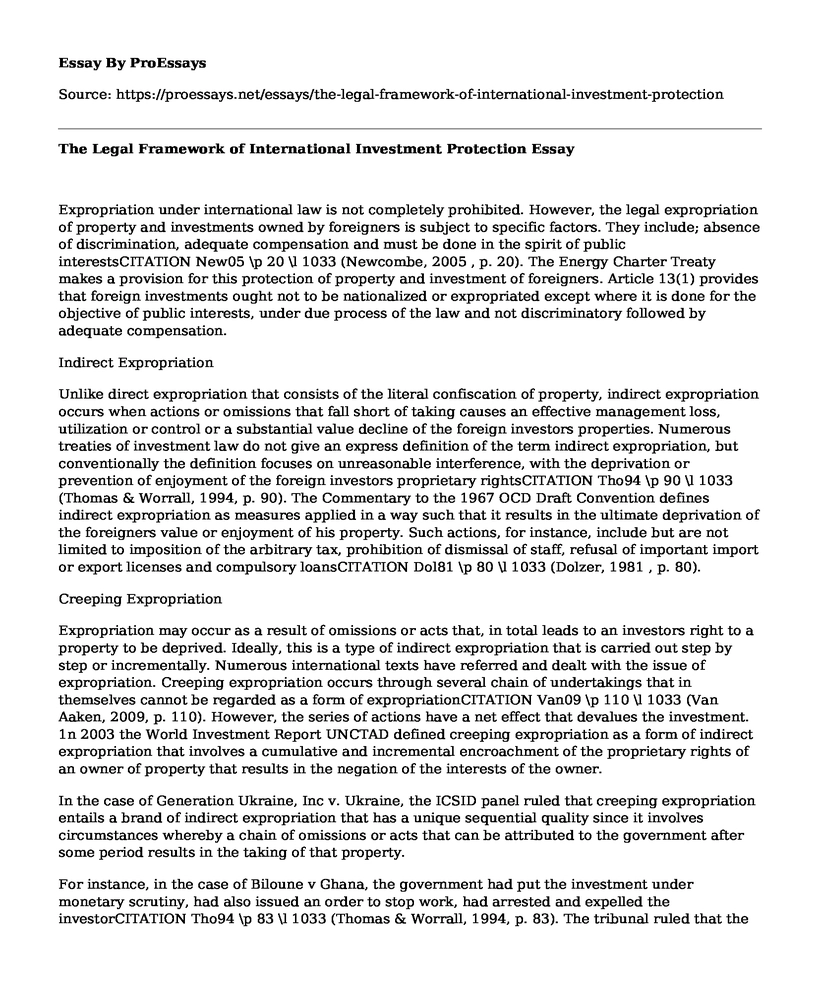Expropriation under international law is not completely prohibited. However, the legal expropriation of property and investments owned by foreigners is subject to specific factors. They include; absence of discrimination, adequate compensation and must be done in the spirit of public interestsCITATION New05 \p 20 \l 1033 (Newcombe, 2005 , p. 20). The Energy Charter Treaty makes a provision for this protection of property and investment of foreigners. Article 13(1) provides that foreign investments ought not to be nationalized or expropriated except where it is done for the objective of public interests, under due process of the law and not discriminatory followed by adequate compensation.
Indirect Expropriation
Unlike direct expropriation that consists of the literal confiscation of property, indirect expropriation occurs when actions or omissions that fall short of taking causes an effective management loss, utilization or control or a substantial value decline of the foreign investors properties. Numerous treaties of investment law do not give an express definition of the term indirect expropriation, but conventionally the definition focuses on unreasonable interference, with the deprivation or prevention of enjoyment of the foreign investors proprietary rightsCITATION Tho94 \p 90 \l 1033 (Thomas & Worrall, 1994, p. 90). The Commentary to the 1967 OCD Draft Convention defines indirect expropriation as measures applied in a way such that it results in the ultimate deprivation of the foreigners value or enjoyment of his property. Such actions, for instance, include but are not limited to imposition of the arbitrary tax, prohibition of dismissal of staff, refusal of important import or export licenses and compulsory loansCITATION Dol81 \p 80 \l 1033 (Dolzer, 1981 , p. 80).
Creeping Expropriation
Expropriation may occur as a result of omissions or acts that, in total leads to an investors right to a property to be deprived. Ideally, this is a type of indirect expropriation that is carried out step by step or incrementally. Numerous international texts have referred and dealt with the issue of expropriation. Creeping expropriation occurs through several chain of undertakings that in themselves cannot be regarded as a form of expropriationCITATION Van09 \p 110 \l 1033 (Van Aaken, 2009, p. 110). However, the series of actions have a net effect that devalues the investment. 1n 2003 the World Investment Report UNCTAD defined creeping expropriation as a form of indirect expropriation that involves a cumulative and incremental encroachment of the proprietary rights of an owner of property that results in the negation of the interests of the owner.
In the case of Generation Ukraine, Inc v. Ukraine, the ICSID panel ruled that creeping expropriation entails a brand of indirect expropriation that has a unique sequential quality since it involves circumstances whereby a chain of omissions or acts that can be attributed to the government after some period results in the taking of that property.
For instance, in the case of Biloune v Ghana, the government had put the investment under monetary scrutiny, had also issued an order to stop work, had arrested and expelled the investorCITATION Tho94 \p 83 \l 1033 (Thomas & Worrall, 1994, p. 83). The tribunal ruled that the conjunction of this factors had the impact of rendering the investment untenable due to the irreparable stoppage of work. Therefore, the state of Ghana by its acts or omissions constructively led to the expropriation of Marine Drive Complex Limited (MDCLs) assets.
Compensation for Expropriation Hull Formula
International law has consistently held that a sovereign nation possesses the right to expropriate alien -owned investment provided the taking is compatible with the law. The standard of the law in international arena requires that the expropriation has to be for the public benefit, not discriminating and ought to be followed by compensation that is just.
In the United States, a foreigner whose investment in the proprietary enterprise has been expropriated entitled to adequate, prompt and effective compensation. The above approach is more often considered as the Hull Doctrine that received its name after the Legendary Cordell Hull former United States secretary of StateCITATION Dol81 \p 77 \l 1033 (Dolzer, 1981 , p. 77). However, this doctrine has to be acknowledged fully in the international arena not only in all the States of the USA. For example, a classical case example of Banco Nacional De Cuba v Chase Manhattan Bank the court held that the hull principle had not acquired the status of customary international law; therefore, the expropriated Chase banks merely deserved the full or appropriate compensation.
References
BIBLIOGRAPHY Dolzer, R., 1981, New Foundations of the Law of Expropriation of Alien Property. Am Journal International Limitedv , pp. 75, 553..
Newcombe, A., 2005 . The boundaries of regulatory expropriation in international law. ICSID Review-Foreign Investment Law Journal, p. 20(1)..
Thomas & Worrall, 1994. Foreign direct investment and the risk of expropriation. ,. The Review of Economic Studies, pp. 61(1), 81-108..
Van Aaken, A., 2009. International investment law between commitment and flexibility: a contract theory analysis. Journal of International Economic Law, pp. 12(2), 507-538.
Cite this page
The Legal Framework of International Investment Protection. (2021, Mar 10). Retrieved from https://proessays.net/essays/the-legal-framework-of-international-investment-protection
If you are the original author of this essay and no longer wish to have it published on the ProEssays website, please click below to request its removal:
- Critical Essay on Letter from Birmingham Jail: Equality Movement
- Is Going to College Worth It? - Essay Sample
- Essay on Laura Ingraham Rhetoric against Gun Rights
- Not Guilty By Insanity Defense - Essay Sample
- Gun Control Debate: 2nd Amendment Interpretation Impacts Lives - Essay Sample
- Essay Example on Popular Heroes or Social Menace? Serial Killers in Media
- 150 Years of St. Elizabeth Healthcare: A History of Providing Quality Care - Report Sample







